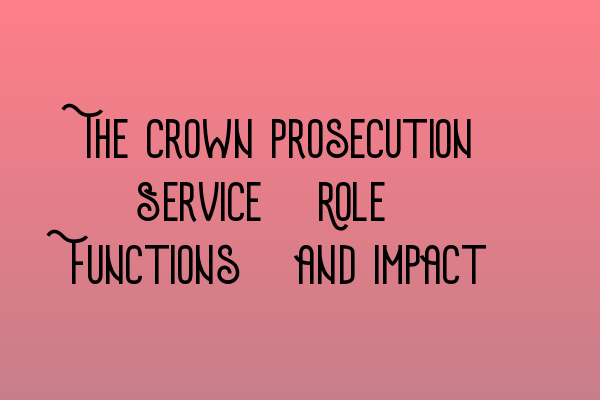The Crown Prosecution Service: Role, Functions, and Impact
Welcome to the SQE Criminal Law & Practice Law UK blog! In this article, we will explore in-depth the role, functions, and impact of the Crown Prosecution Service (CPS). As a solicitor, it is vital to have a comprehensive understanding of the CPS and its significance in the criminal justice system. Let’s delve into the intricacies of this essential organization.
Role of the Crown Prosecution Service
The Crown Prosecution Service plays a crucial role in the criminal justice process in England and Wales. Its primary function is to examine and prosecute criminal cases that have been referred to them by the police or other investigating authorities. The CPS works tirelessly to ensure that justice is served and that the guilty parties are held accountable for their actions.
When a case is referred to the CPS, they conduct a thorough review of the evidence provided by the police. This review process involves examining witness statements, forensic evidence, and any other relevant information. The CPS evaluates the strength of the case and determines whether there is sufficient evidence to proceed with the prosecution.
If the CPS decides to prosecute, they take on the responsibility of presenting the case in court. They work closely with the police, victims, and witnesses to gather all the necessary evidence and build a robust prosecution case. The CPS barristers, who are experienced advocates, represent the prosecution in court proceedings.
It is important to note that the CPS acts independently from the police and other investigative bodies. This independence ensures that the CPS exercises impartiality in their decision-making and pursues justice in an objective manner.
Functions of the Crown Prosecution Service
The Crown Prosecution Service performs various functions to carry out its role effectively. These functions include:
1. Decision-Making:
The CPS is responsible for making decisions regarding whether to charge individuals with criminal offenses. These decisions are made based on the Code for Crown Prosecutors, which sets out the legal tests that must be satisfied for a prosecution to be initiated.
It is important to mention that the CPS operates under the principle of “Prosecution Rightly Seeking the Truth.” This principle emphasizes the importance of fairness, honesty, and integrity in the criminal justice process.
2. Case Preparation:
The CPS dedicates significant resources to prepare cases for prosecution. This involves working closely with the police to ensure that all relevant evidence is collected and disclosed to the defense. The CPS prosecutors review the evidence and build a compelling case that withstands scrutiny in court.
During the case preparation stage, the CPS also engages with victims and witnesses, providing them with support and guidance throughout the process. This ensures that their rights are upheld and that they have a voice in the proceedings.
3. Court Advocacy:
One of the most crucial functions of the CPS is court advocacy. CPS barristers represent the prosecution in court and present the case to the judge and jury. Their expertise, knowledge of the law, and persuasive skills are instrumental in obtaining successful outcomes in criminal trials.
Throughout the trial, the CPS barristers aim to present the evidence accurately and effectively. They cross-examine witnesses, challenge the defense’s case, and make compelling legal arguments to secure convictions where appropriate.
Impact of the Crown Prosecution Service
The Crown Prosecution Service has a significant impact on the criminal justice system and society as a whole. Its work ensures that perpetrators of crimes are held accountable, and victims receive the justice they deserve. The impact of the CPS can be seen in several key areas:
1. Deterrence:
The existence of the CPS plays a crucial role in deterring individuals from engaging in criminal activity. The knowledge that their actions will be thoroughly investigated and prosecuted acts as a deterrent for potential offenders.
2. Public Confidence:
By diligently carrying out their duties, the CPS contributes to maintaining public confidence in the criminal justice system. People need to trust that those who commit crimes will be prosecuted, and the CPS plays a fundamental role in upholding this trust.
3. Equality and Fairness:
The CPS has a duty to ensure that everyone is treated equally under the law. They must consider all relevant factors, such as race, gender, and social background, when making charging decisions. This commitment to equality promotes fairness and prevents discrimination within the criminal justice system.
4. Victim Support:
The CPS places significant emphasis on supporting victims throughout the criminal justice process. They communicate with victims regularly, providing updates on the progress of their case and offering guidance and reassurance. This support ensures that victims feel heard, respected, and supported during a challenging time in their lives.
In conclusion, the Crown Prosecution Service plays a vital role in the criminal justice system. Through its decision-making, case preparation, and court advocacy functions, the CPS ensures that criminals are held accountable for their actions. The impact of the CPS extends beyond the courtroom, promoting deterrence, public confidence, equality, fairness, and providing support to victims.
For more information about the SQE Criminal Law & Practice Law UK, check out our related articles:
